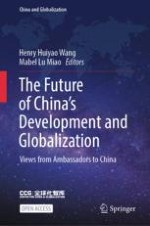Open Access 2024 | Open Access | Buch

The Future of China’s Development and Globalization
Views from Ambassadors to China
herausgegeben von: Henry Huiyao Wang, Mabel Lu Miao
Verlag: Springer Nature Singapore
Buchreihe : China and Globalization
Open Access 2024 | Open Access | Buch

herausgegeben von: Henry Huiyao Wang, Mabel Lu Miao
Verlag: Springer Nature Singapore
Buchreihe : China and Globalization
This is an open access book.
As the world continues to recover from the fear and uncertainty of the Covid-19 pandemic, a new set of challenges like increased geopolitical tensions and climate change have become increasingly prominent. This open access book, which contains the views of ambassadors to Beijing on topics ranging from bilateral relations to potential cooperation, global development and even more of the most immediate issues, aims to help readers make sense of our changing world and China’s role in it.
Building on the success of our previous volume China and the World in a Changing Context: Perspectives from Ambassadors to China, the Center for China and Globalization (CCG) has invited 27 ambassadors to examine China’s role in this context of constant flux, focusing specifically on China’s perspective, including its trade and investment ties with other countries, as well as its role in multilateral regional relations and global governance.
These diplomatic envoys from countries around the world serve as pivotal contact points between nations across a wide range of fields, from economics and culture to health and the environment. Their perspectives, representing both developing and industrialized countries, are both invaluable and illuminating—not only in conveying the views and experiences of their own country, but also for their insights into global affairs and China’s development.
It is our hope that the views expressed in this volume will inspire even more discussion on the next best step to take in finding solutions to the problems we face, and in particular how China can use its own experience and wisdom to better contribute and engage with the world in finding solutions together. This book provides a wealth of perspective and insight that we hope will benefit not only academics and policy makers, but also the private sector and individuals.